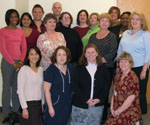MUSC Heroes
Clinical Trials Office
praised for dedication
by Cindy
AbolePublic Relations
Teamwork is defined as work conducted by coworkers with each individual contributing something in support of achieving a desired result or whole effort.
 Members of the
Hollings Cancer Center Clinical Trials Office.
Members of the
Hollings Cancer Center Clinical Trials Office.It’s teamwork that describes the 19-member crew that makes up the Hollings Cancer Center (HCC) Clinical Trials Office. It is their job to manage a program that is the foundation for delivering lifesaving clinical cancer trials statewide. The staff has the arduous task of tracking and managing information for approximately 1,000 patients that have participated in clinical trials. This involves communicating with study patients at least twice a year for the rest of their lives.
“Our staff are everyday heroes,” said Terri Matson, director of clinical operations for the group. “They do their best to help provide the most cutting-edge treatments to patients. They contribute so much support for patients and their families.”
Both Matson and co-director Cheryl Sampson, director of administrative operation, couldn’t be prouder of their dedicated, multi-talented team of study coordinators, clinical support staff and administrative personnel. Charged with maintaining the clinical trial program’s infrastructure, the staff must constantly focus on accuracy, good communications and attention to details to comply with federal regulations and be flexible and sensitive to patients and their needs, the clinical care and research staffs and outcomes. Everyone brings different talents, experiences and perspectives to our team, Matson said.
“Our group works with lots of different trials groups in the Department of Medicine, Institute of Psychiatry and Hollings Cancer Center managing negotiations and finalizing agreements and budgets among our institution’s sponsored research studies,” said Cindy McDonald, program manager, corporate grants consultant, Institutional Review Board Research Office. “The HCC Clinical Trials group is one of the hardest working staffs I’ve worked with. They provide me with everything I need to do my part.”
MUSC’s history with clinical trials began in 1986. The first trials were in the area of malignant hematology oncology and helped lymphoma and leukemia patients. Today, HCC sponsors clinical trials in more than
a dozen health programs.
“Sponsoring a clinical trials program is one of the most important things we provide to our cancer patients,” said Robert Stuart, M.D., professor of Medicine, Division of Hematology/Oncology, who manages HCC’s hematological malignancy clinical trials. “Not only are we helping today’s patients with cutting-edge treatments but we’re providing new cures and therapies. The Clinical Trials office staff make it possible to gain knowledge that will contribute to the health of future generations. I can’t think of anything that’s more important.”
Study coordinator Susan Shannon has worked with thoracic oncology patients since 2003. A registered dietician, Shannon, relies on her expertise to help understand or resolve a patient’s dietary issues or other related challenges.
“I think that it is great that the clinical trials office is being recognized as MUSC’s heroes,” said Susan Keller, R.N., Hollings Cancer Center. “I work with Dr. Sherman in thoracic oncology at Hollings and Susan does an amazing job. She is available to us any time of the day and is usually present with us in clinic. She knows her studies so well and directs Dr. Sherman and me when a patient needs something. I can not imagine doing her job and have told her so on many occasions. She cheerfully keeps up with every date and signature and what each patient is doing and when. Our patients love her and look forward to seeing her....I cannot sing her praises enough.”
Last year, organizers celebrated the expansion of the program to Orangeburg and Columbia, opening greater opportunities for South Carolinians to access the latest cancer treatment options and lifesaving therapies available. The research network allows cancer physicians to collaborate with researchers and other specialists to enhance cancer care to patients statewide.
“The clinical trials staff works behind the scenes taking care of patients and families in many ways,” said Tamara N. Bowman, R.N., clinical care coordinator, Hollings Cancer Center. “This staff has been proactive in legislative efforts to increase patient access to trials. They are extremely knowledgeable and they remain flexible in their very busy and demanding roles.”
“We’re always looking to improve and fine tune our efforts,” said Sampson, who’s been with the office for four years. “Working with contracts and the IRB, we expect change. That’s why its important that we examine things by adopting the outside-the-box mentality. Both Terri and I are always open to new ideas and tell our staff that our door is always open.”
HCC Clinical Trials Office
Terri Matson, director for clinical operations; Cheryl Sampson, director for administrative operations; Tricia Adrales-Bentz; Alan Brisendine; Linda Cooper; Amanda Fisher; Patricia Infinger; Jasmine Mullins; Tara Novit; Jackie Nguyen; Hannah Puckett; Shanta Salzer; Susan Shannon; Tamara Saunders; Theresa Thomas; Simone Venning; Brigette Taylor-White; Christina Wilhoit; and Shilpa Williams
Editor’s note: At MUSC, heroes abound. They exist in the form of caregivers, faculty, students and staff. The Catalyst's MUSC Heroes is a column that offers employees and staff the opportunity to recognize MUSC's everyday heroes. Send an e-mail about your MUSC hero along with your name and office phone number to catalyst@musc.edu or aboleca@musc.edu.
Friday, Jan. 20, 2006
Catalyst Online is published weekly,
updated
as needed and improved from time to time by the MUSC Office of Public
Relations
for the faculty, employees and students of the Medical University of
South
Carolina. Catalyst Online editor, Kim Draughn, can be reached at
792-4107
or by email, catalyst@musc.edu. Editorial copy can be submitted to
Catalyst
Online and to The Catalyst in print by fax, 792-6723, or by email to
catalyst@musc.edu. To place an ad in The Catalyst hardcopy, call
Community
Press at 849-1778, ext. 201.